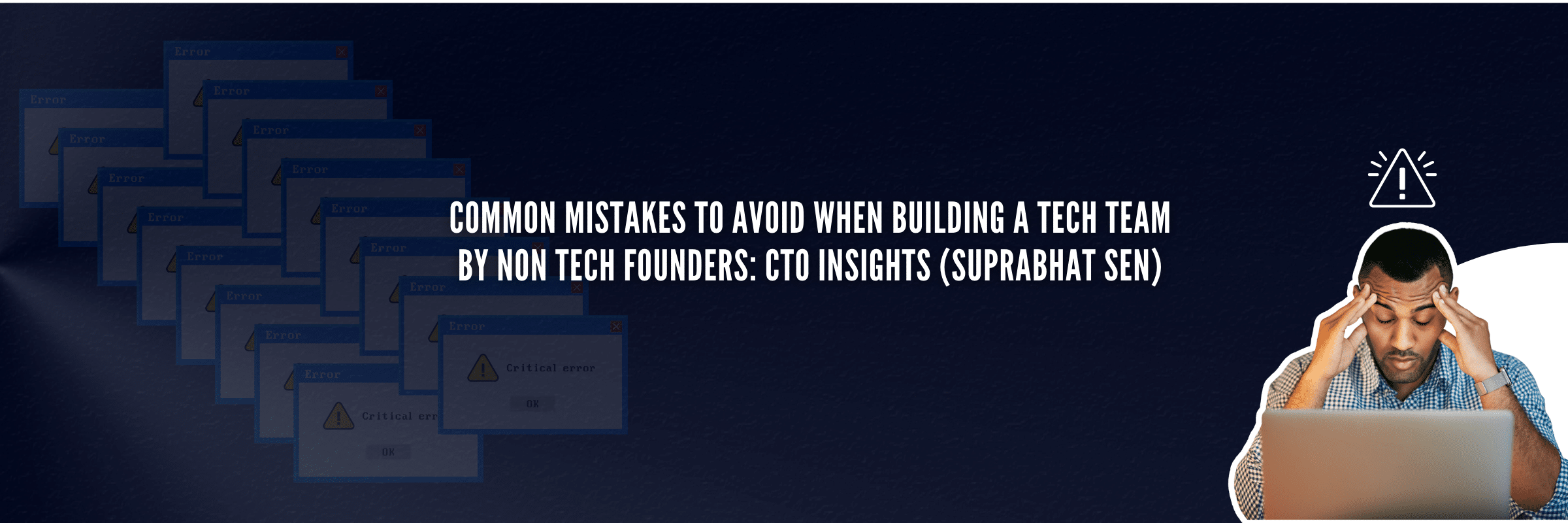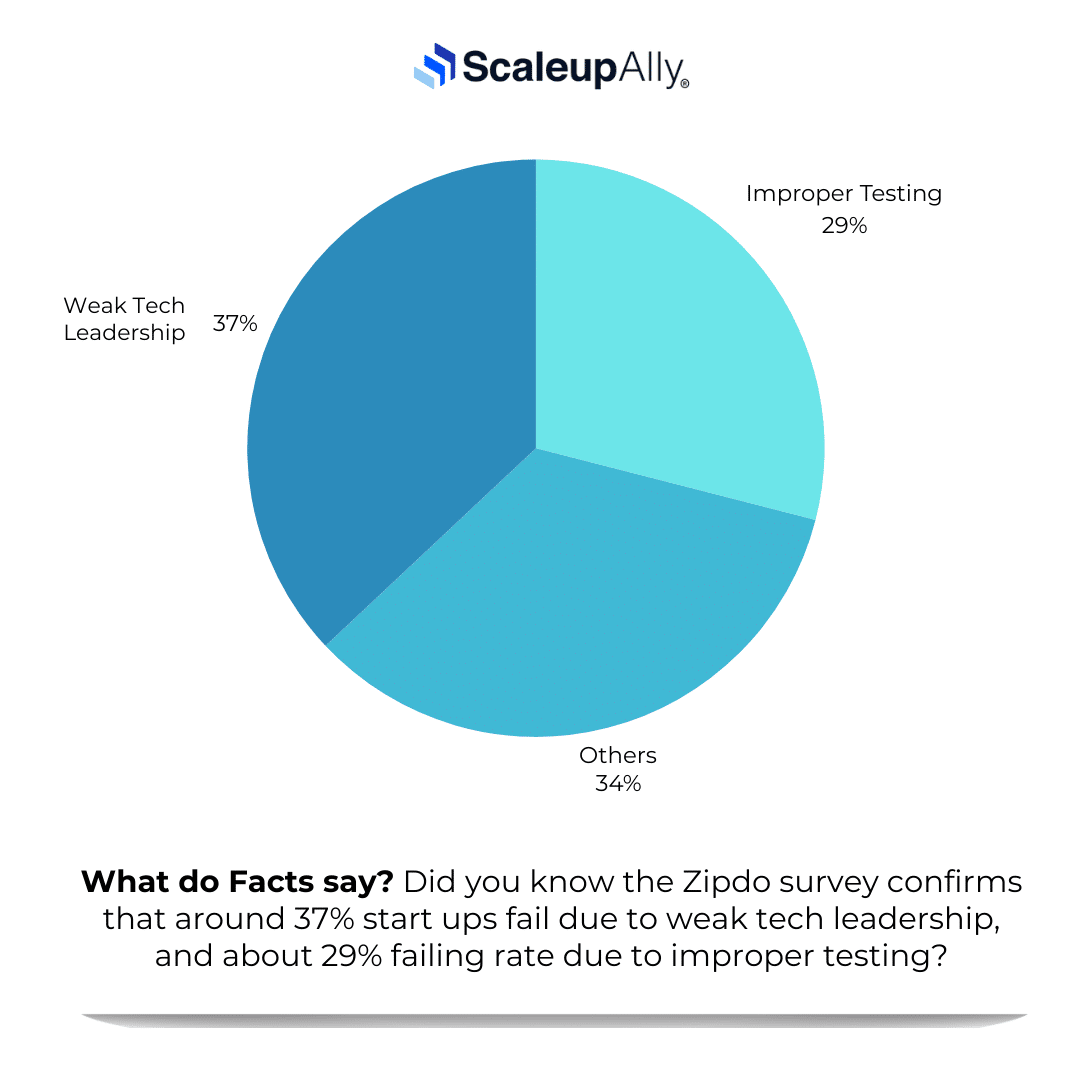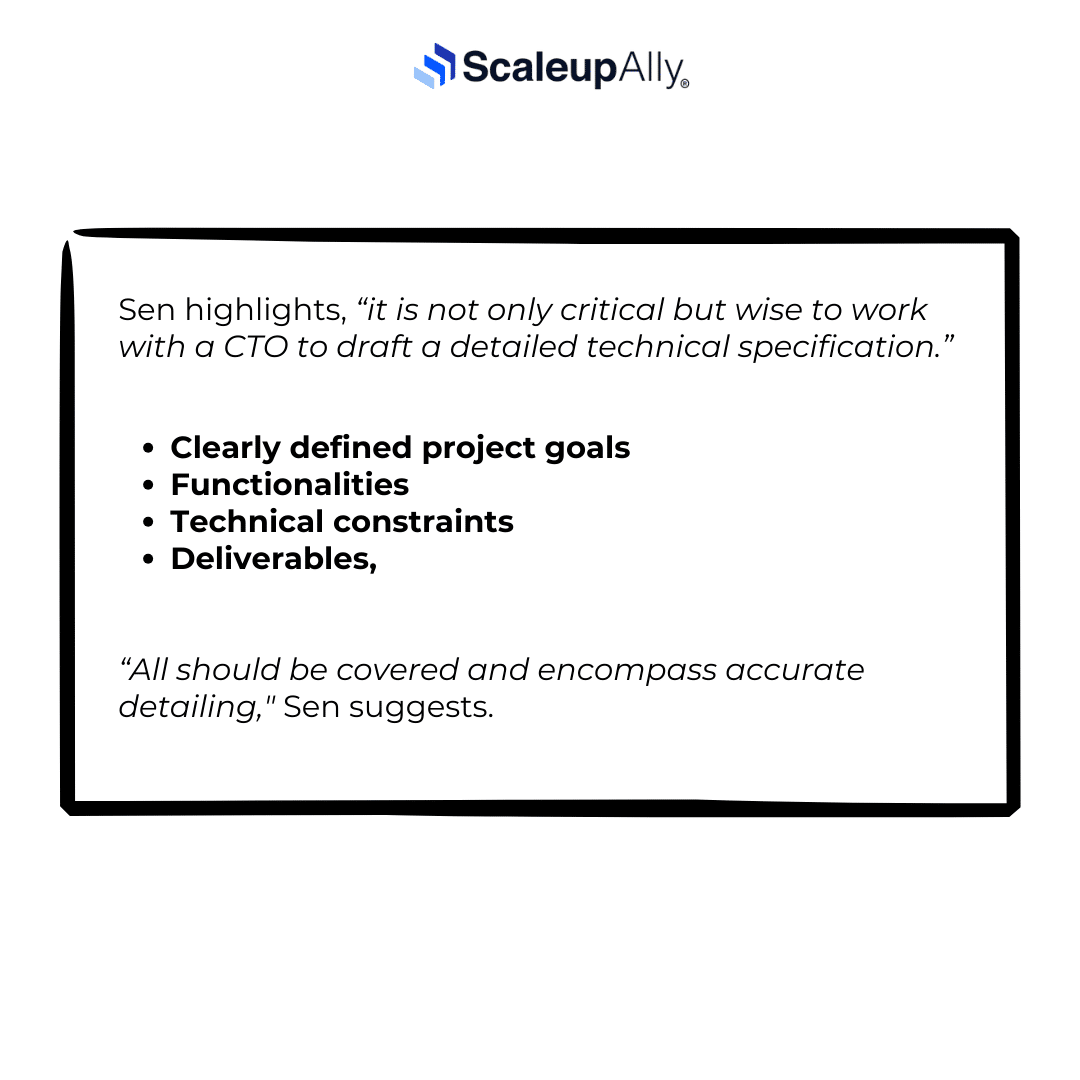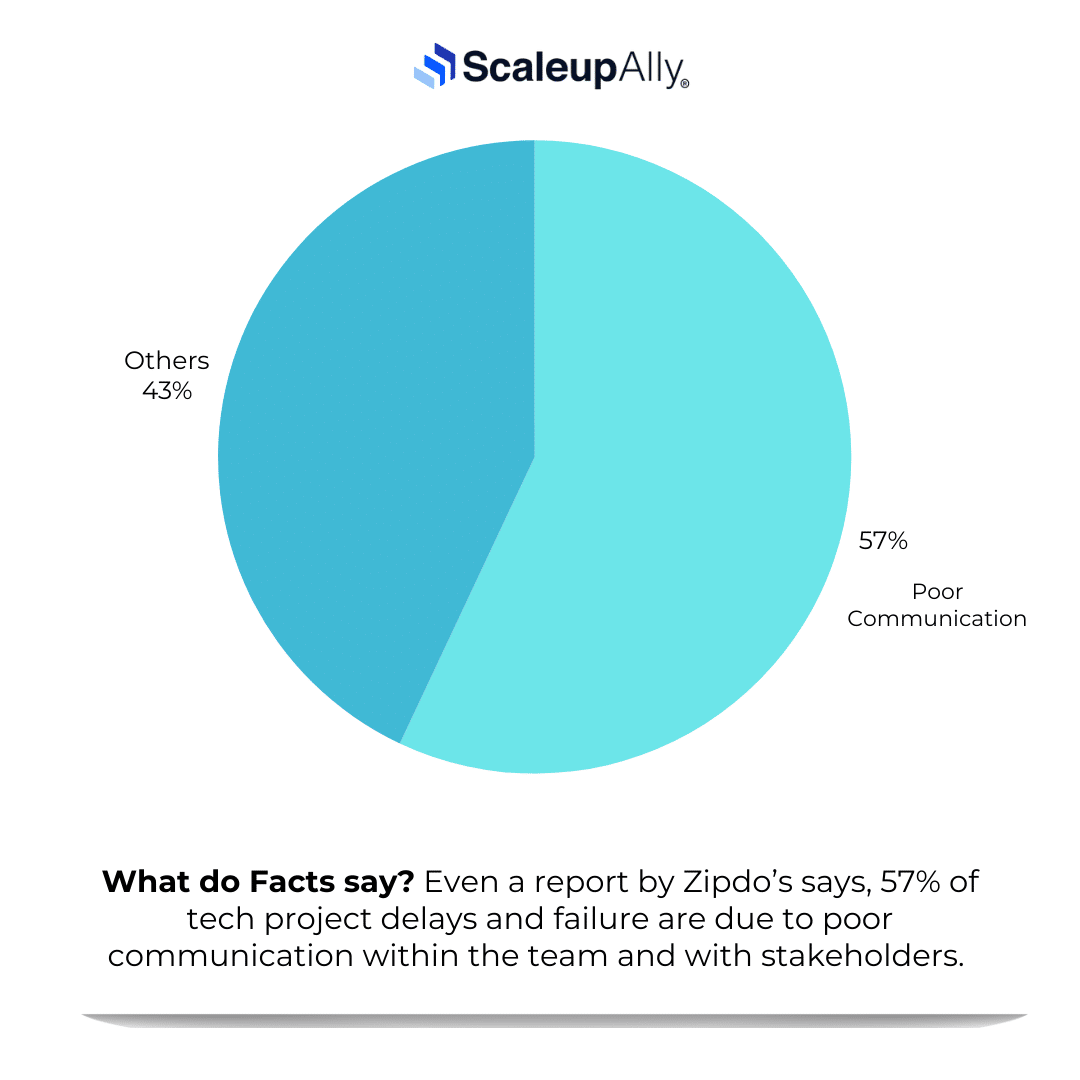
Common Mistakes Non-Tech Founders Make When Building a Tech Team: CTO Insights (Suprabhat Sen)
ScaleupAlly Team | September 8, 2024 , 8 min read
Table Of Content
Worst Mistake a Non-tech founder could make? To wait for an apple to fall!
Starting a tech company is a laborious task in itself, and waiting around to decide upon how to build a tech team would stare right back at you. This loop would have no immediate effect, but it soon grows its teeth, and those teeth do bite. We know, that’s why we are here with you.
To sit with the unknown is mostly intimidating, but once you do it, your appetite for it grows over time. For it is the discovery of knowledge that gives us that zest. Suprabhat Sen (ScaleupAlly), a seasoned CTO with extensive experience in leading tech teams, successfully completing many tech projects, shares his insights on common mistakes to avoid when building a tech team.
Before we start, we have a few questions for you.
1. How do you make an estimated budget for your tech business?
2. How do you calculate what technical resources you may be needing for the next three years?
If by any chance, you find yourself scratching your head, this blog will help you find some worthy answers. Let us begin!
Key Takeaways
- Non-tech founders often fail to recognize the critical role of a skilled Tech Lead or CTO, which can lead to poor technical decisions and wasted funds.
- A lack of clarity on technical requirements is a leading cause of tech project failures, resulting in misaligned strategies and scope creep.
- Skipping training and development stunts team growth and product quality, whereas investing in upskilling improves retention and future-proofing.
- Ignoring technical debt early on can lead to massive long-term costs and unscalable codebases.
- Poor communication between non-tech founders and tech teams often derails projects; structured updates and having a CTO bridges this gap effectively.
Common Mistake 1: Not having a Strong Tech Lead.
Non-tech founders may underestimate the role of a skilled tech lead or CTO, during tech team building. Yes! Common mistake, and counterproductive too.

“Many startups don’t see the light of the day because their founders lack technical expertise. Outsourcing their projects to unqualified freelancers, starting with wrong technologies, not paying attention to optimization, keeping customer credit card data in their databases unencrypted,” reveals Sen.
Sen asserts, “hiring a competent tech lead with a proven track record is a smart decision.”
Tech Lead, or CTO’s prowess in technologies and experience in the field would not only save time, but would prevent fund leakages.
S/he would bring Code Quality, better testing standards, an eye for detailing, establishing SoPs, creating metrics and timely warding off any plausible intellectual property infringement issues.
In addition to these, S/he would be able to anticipate the unanticipated beforehand.
Common Mistake 2: Inadequate Clarity on Technical Requirements.
Founders with non tech background may find themselves clueless regarding the technical requirements their project would need.
What do Facts say? According to a report by Zipdo’s “Essential Software Project Failure Statistics in 2023“, 39.03% of tech projects fail due to unclear or constantly changing requirements.
“The chances of overlooking nuts and bolts in defining these technicalities from the start are quite high, leading to wasted resources, misaligned approach, and sneaky scope creep,” Sen shares.

Common Mistake 3: Hesitating to invest in Training and Development.
Sen points out “Non-tech founders may put pressure on immediate needs, marching to his/her own beat. This ends up as a tech liability, where team’s proficiency takes the toll, and the entire product may suffer from inferior foundation.”
What do Facts say? A 2024 LinkedIn Workplace Learning report highlighted that “94% of employees stay longer in companies that invest in their professional development.”
Sen insists, “CTO would not only understand the importance, as s/he knows how fast paced technologies are evolving, s/he would be able to better decide upon the right kind of training the team requires.“
Additionally, regular workshops, and conferences would add up to the knowledge bag for sound industry updates.
Investing in employee development also boosts employees’ sense of connection to the organization and motivates them to stay longer. Your recurring team retention issue is resolved!
Common Mistake 4: Elephant in the room, Technical Debt.
This occurs when the speed is prioritized over long term design in software development. It’s like taking a shortcut to meet a deadline, but knowing you’ll have to put in extra effort later to fix it.
It has implicated financial costs too, due to an increased maintenance cost, and decreased quality.

What do Facts say? Latest research done by Sonar Source reflects some concerns as “over a five-year period, it’s estimated that costs due to technical debt for one million lines of code can reach US $1.5 million (equivalent to 27,500 developer hours).”
Sen expresses, “Surely, this is a blindspot, a bad one. Financial loss is inevitable! Non-tech founders may underestimate how much damage technical debt can cause to all the efforts and time they have been dearly investing.”
“Not having a CTO or poor collaboration with your tech team to identify and address technical debt early in the development process, could lead to stagnancy”, Sen firmly warns.
“Prioritize refactoring the issue with the tech lead, so that your codebase remains maintainable and scalable”, he conveys.

Common Mistake 5: Chaotic Communication Channels.
Sen comments, “Oftentimes, the communication gap, not filling in the blanks, and leaving things out for guesswork derails the entire project. Especially, the plausible knowledge gap between the Non tech founders and the tech team, resulting in impaired outcomes.”

Communicating the essentials is as important as everything else. For instance, non tech founder could demand a feature change on the fly, without having the grasp of the estimated timeline (infamously known as Scoop and Poop), and the tech team might end up using shortcuts, which could lead to another issue, i.e., Technical Debt.
Vice versa, the tech team may bluff the founder with extended timelines, probably precipitating the funds. More issues like genuine concerns falling to deaf ears, or the organization falling prey to micromanagement.
Sen advises to set up regular meetings, status updates, and clear communication channels between the tech team and other stakeholders. Keeping everyone on the same page regarding project progress and expectations.
1. With respect to CTO, Sen opines to having one, CTO helps build better synergy between the tech team, non tech founder and other stakeholders.
2. The tech team would be freely able to discuss and find solutions to their tech related challenges.
3. On the other hand, non tech founders would be at ease, since now s/he can discuss the urgent matters and understand the nitty gritty with a proficient tech leader.
Final Thoughts
At the present time, we have many successful stories of how people with no technical background came up with ground breaking ideas and with the help of adept techies, they together built empires.
Off the top of my head, Brian Joseph Chesky, the CEO and Co-founder of Airbnb is someone who busted all the myths.
With an academic background in Fine Arts, he ventured into hospitality, and successfully showed everyone how it’s done.
According to Forbes, he is amongst the 200 richest people in the world, with a net worth of USD 9.4 bn. Some more reputed names are – Steve Jobs, Jack Ma, Evan Thomas Spiegel. If this doesn’t inspire you, what will?
Building a team can be intimidating, keeping the common mistakes to avoid when building a tech team in mind while building your product, would open many extraordinary opportunities.
Last, but not the least, we have seen remarkable results when the founders are culturally aligned with each other.
Having good faith in each other’s strength, they comfortably sync better and hence, the founder to founder good communication establishes more stability in the company.
If you have read through the entire blog, we are sure you have found some value in it. We are hoping that you will come back for more such insights.
For now, we will leave you with a few more questions to ponder upon. What is your strategy for building a tech team? How do you plan to structure it, and what key skills will you be focusing on in the hiring process?
For the readers, here are a few suggestions by Suprabhat Sen (CTO, ScaleupAlly) to fine tune your knowledge on the technical front and stay up to date with the tech world:
Source:
Related Blogs

Nearshoring vs. Offshoring vs. Onshoring: Key Differences
Discover the key differences between nearshoring, offshoring, and onshoring. Learn the benefits, challenges, and how to choose the best outsourcing strategy for your business.
webadmin
Feb 13 ,
6 min read

Top 20 Emerging Technologies of 2026
Discover the top 20 emerging technologies of 2026. Explore which innovations are driving change across healthcare, finance, manufacturing, and other crucial industries.
ScaleupAlly Team
Dec 16 ,
9 min read

IT Outsourcing Costs Explained: Global Rates, Key Influencers & Cost-Saving Tips
Discover what IT outsourcing costs include, key pricing factors, hidden fees, regional rates, and how to pick a cost-effective outsourcing partner.
Pranay Agrawal
Nov 29 ,
13 min read


